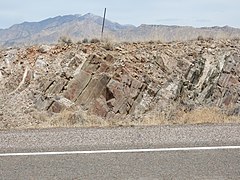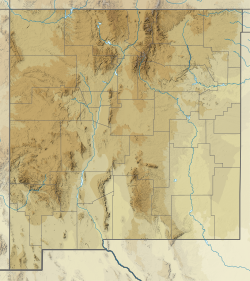| Abajo Formation | |
|---|---|
| Stratigraphic range: Statherian Pha. Proterozoic Archean Had. | |
 Abajo Formation in a road cut west of Abo Pass, New Mexico, US Abajo Formation in a road cut west of Abo Pass, New Mexico, US | |
| Type | Formation |
| Unit of | Manzano Group |
| Underlies | White Ridge Quartzite |
| Overlies | Sevilleta Metarhyolite |
| Thickness | 4,500 ft (1,400 m) |
| Lithology | |
| Primary | Schist |
| Other | Lithic arenite |
| Location | |
| Coordinates | 34°34′30″N 106°29′31″W / 34.575°N 106.492°W / 34.575; -106.492 |
| Region | Los Pinos Mountains, New Mexico |
| Country | United States |
| Type section | |
| Named by | S.H. Baer |
| Year defined | 2004 |
  | |
The Abajo Formation is a geologic formation in the Los Pinos Mountains of central New Mexico. It was deposited about 1660 million years (Ma) ago, corresponding to the Statherian period.
History of investigation
The unit was first defined by S.H. Baer in 2004. and assigned to the Manzano Group by Amy Luther in 2006.
Geology
The formation is divided into two members. The Abajo Lithic Arenite consists of various metasedimentary rocks interbedded with amphibolites interpreted as metamorphosed gabbroic dikes. The Abajo Schist consists of metasedimentary schist interbedded with metamorphosed basaltic dikes and flows. The formation is interpreted as sediments deposed during a period of volcanic activity.
Detrital zircon grains in the formation are almost identical in age and isotope composition to the underlying Sevilleta metarhyolite, suggesting that the sediments of the quartzite were weathered almost exclusively from local sources. The minimum zircon age is about 1660 Ma, and radiometric dating of underlying and overlying formations place the age of the formation at about this time.
References
- ^ Baer, Shannon H (2004). "Geologic and tectonic evolution of the Manzano Peak Quadrangle, central New Mexico [master's thesis]". Earth and Planetary Sciences Etds. University of New Mexico. Retrieved 28 February 2022.
- Luther, Amy (2006). "History and timing of polyphase Proterozoic deformation in the Manzano thrust belt, central New Mexico [master's thesis]". Earth and Planetary Sciences Etds. Retrieved 27 August 2020.
- Baer, Shannon; Karlstrom, Karl E.; Bauer, Paul; Connell, Sean D. (2004). "Geologic map of the Manzano Peak 7.5-minute quadrangle, Valencia and Torrance counties, New Mexico" (PDF). New Mexico Bureau of Geology & Mineral Resources Open-file Geologic Map. 61. Retrieved 28 February 2022.
- Holland, Mark E.; Grambling, Tyler A.; Karlstrom, Karl E.; Jones, James V.; Nagotko, Kimberly N.; Daniel, Christopher G. (September 2020). "Geochronologic and Hf-isotope framework of Proterozoic rocks from central New Mexico, USA: Formation of the Mazatzal crustal province in an extended continental margin arc". Precambrian Research. 347: 105820. Bibcode:2020PreR..347j5820H. doi:10.1016/j.precamres.2020.105820. S2CID 225308346.
- Medaris, L. Gordon; Singer, Brad S.; Jicha, Brian R.; Malone, David H.; Schwartz, Joshua J.; Stewart, Esther K.; Van Lankvelt, Amanda; Williams, Michael L.; Reiners, Peter W. (September 2021). "Early Mesoproterozoic evolution of midcontinental Laurentia: Defining the geon 14 Baraboo orogeny". Geoscience Frontiers. 12 (5): 101174. doi:10.1016/j.gsf.2021.101174.